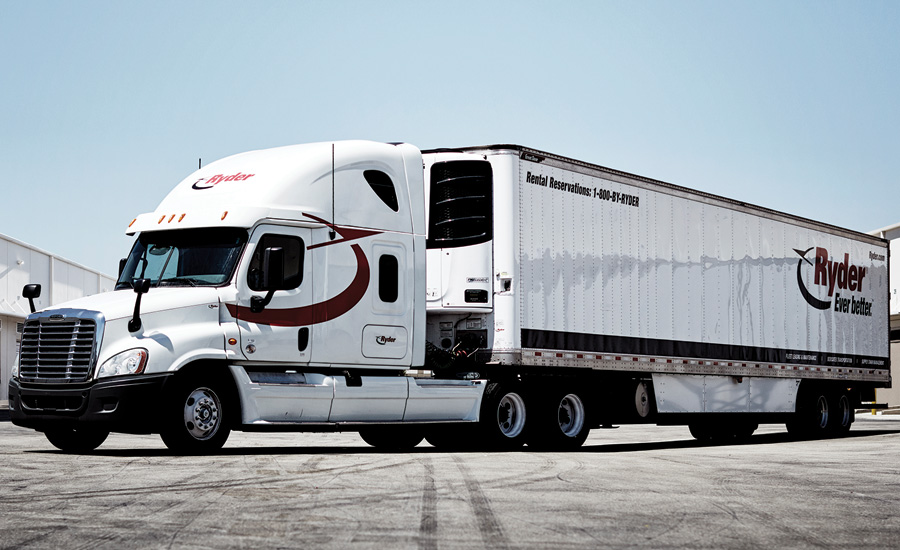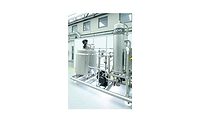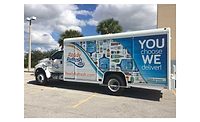Leasing can benefit smaller beverage fleets
Ryder’s ChoiceLease offers flexibility in maintenance, financial options

With a few notable exceptions, full-service leasing continues to be much more popular among the very large fleets than it is among the smaller fleets of Beverage Industry readers.
In general, an oft-cited reason for smaller fleets eschewing leasing is the cost. However, large fleets didn’t get bigger by needlessly spending money, so perhaps the “big guys” know some things that the smaller fleets haven’t yet considered.
One benefit of huge fleets is having a dedicated person, like a chief financial officer or controller, who will perform an in-depth comparison of buying versus leasing and maintaining in-house versus outsourcing. Because a substantial percentage of them opt for the benefits of full-service leasing, one can presume financial and business reasons support the choice.
Miami-based Ryder Systems Inc. long has offered several leasing solutions to fit a wide range of needs and fleet sizes. Because each fleet has unique and specific needs, last year Ryder launched ChoiceLease, its newest portfolio of leasing options. Through ChoiceLease, Ryder offers flexibility, choice and control to fleets that are working to find solutions that best fit their business.
The following are some options offered through ChoiceLease:
Full-service maintenance: Bumper-to-bumper maintenance coverage for new and pre-owned trucks, tractors and trailers.
Preventive maintenance: Available for new and pre-owned trucks, tractors and trailers, with the ability to choose where and when to go for repair work.
On-demand maintenance: Available for new trailers and pre-owned trucks, tractors and trailers, offering a pay-as-you-go maintenance when and where it’s needed, with pre-negotiated rates as an added benefit.
Flexible equipment options: A wide selection of new or used tractors, trailers and trucks from a variety of manufacturers.
Flexible terms: Short-, medium- or long-term leases are available.
Flexible financing: Multiple financing options are offered to help businesses take advantage of tax benefits.
Value-added services: Fuel, insurance and safety services are included.
Although Ryder has offered many of these options through various channels, ChoiceLease brings them together with the team and the tools needed to help fleets find the best package of services for their needs.
“All customers have different needs and are at different points in their organization’s evolutionary cycle,” says John Barlow, Ryder’s ChoiceLease vice president of global products. “Our sales people are trained specifically to begin with understanding a customer’s needs regarding everything from the spec of the equipment to financial goals and asset management strategy. Through our Total Cost of Ownership model, we can illustrate various scenarios and walk them through in great detail so that they can make an educated decision.”
A bottom-line cost of an outsourced maintenance program can be overwhelming in comparison to a fleet’s assessment of its internal maintenance costs. Often, this is because some of the less-than-obvious costs of do-it-yourself maintenance can be overlooked.
“There are a number of factors we have encountered that often go overlooked,” Barlow says. “Let’s take cost of capital to start. Many companies only consider the interest rate that a bank might charge them for a conventional business loan. The equity portion of cost of capital is often not understood and, therefore, left out.
“Many times, even if an equity cost of capital is considered, the analysis fails to include a small- to medium-sized business risk premium (i.e., larger businesses will have a lower equity hurdle rate than smaller- to medium-sized businesses because of their typically stronger financial positions),” he continues. “Related to cost of capital is opportunity cost. To understand your opportunity cost, you need to know your cost of capital.”
Barlow emphasized one question that businesses should ask themselves: “Could the money that I would be tying up in my vehicles be put toward some profit-generating activity or asset, as opposed to one that declines in value over time?”
“Another overlooked cost is the cost of dealing with downtime,” Barlow says. “We often see that an analysis fails to take into consideration the need for a substitute vehicle. With our lease programs, your substitute vehicles are included in your price at a discounted rate compared to what you would pay to rent a vehicle at counter prices.”
Wrapping up, Barlow summarizes two of the top benefits of full-service leasing.
“The main consideration in choosing an outsourced maintenance program is uptime. A customer’s primary concern is having the vehicle in operation, running efficiently and safely,” Barlow says. “With an outsourced maintenance program, a customer can achieve consistency in standard services and repairs, lock in favorable rates if they commit to a contract upfront, and tap into the provider’s vast network of service locations, ensuring they are covered no matter where they are.
“As previously mentioned, no two businesses are the same, and as such, savings vary from customer to customer,” he continues. “With that said, in most cases, when compared to owning a fleet, we see up to 20 percent savings on average when a customer elects to enter into a full-service lease agreement with Ryder.” BI
Looking for a reprint of this article?
From high-res PDFs to custom plaques, order your copy today!






